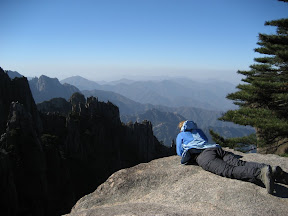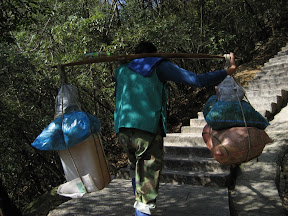'Will work for food' works

Last weekend Jesse, Christy (Jesse’s wife), Ela and I climbed HuangShan (Yellow Mountain) in Anhui province. Escaping the gritty Shanghai air, we found ourselves at the foot of a UNESCO Heritage Site on Saturday morning after a 12 hour train ride followed by an hour long bus ride through the Chinese country side. I think we were all a little skeptical of this place, given that all the ‘trails’ are paved with stairs and that the Chinese sometimes wildly exaggerate things, like ‘Once you see HuangShan, you won’t want to see any of the other mountains in China’.
Well, the locals weren’t kidding. It was beauty overload. HuangShan isn’t just one mountain, but a mountain range, like the Rocky Mountains. And it is all accessible by foot. After getting to the top, we found a breathtaking scenic stop every few hundred feet or so along the trail. As Jesse pointed out, it didn’t feel like we were working hard enough to be rewarded with these magnificent scenes at every turn.
But we met a bunch of people who were working hard for their food along the trails. In order to feed and house hungry visitors at the top of the mountain, companies will hire porters to carry everything up and down the mountain. Mind you, there is a perfectly functional cable car system up this mountain – but it is STILL cheaper to just hire people to climb up and down the mountain with up to 85kg of stuff on their backs. So all weekend, we saw ‘li hai’ (very strong and fierce) porters carrying everything including eggs, vegetables, tired hikers, old mattresses, and dirty laundry up and down the mountain. At one point, we even saw six porters chanting and working together to carry a very heavy marble pillar up the mountain. I think it was also shocking and amusing to some of the Chinese visitors that we decided to hike up the mountain instead of taking the cable car, which we could obviously afford. The time of hard physical labor and suffering is still near and dear in the memories of the Chinese, so perhaps avoiding it as much as possible is a good thing. More photos of Huangshan.
In a country with many hands, everyone wants a job, no matter how small. This is a powerful workforce that can do great things. The fact that giving people jobs matters most also affects how things are designed, manufactured and serviced. Here are some associated observations:
1. Instead of laying down tile that is textured to prevent people from slipping on the trails at HuangShan, it is cheaper to pour concrete flat, and have people chisel in the texture afterwards.
2. Delivery of almost everything is free – from train tickets to my stir-fry tomato and egg lunch (which was already really amazingly decent at 50 cents). This harks back to my experience at IKEA as well. There are people outside clambering to help you take your furniture home and assemble it.
3. My favorite example out of Ted Fishman’s China, Inc: It is entirely possible to turn low quality leather into high quality leather for cheaper than buying high quality leather to start with, because you can hire people to cut out little patches of leather to fill in the holes exactly.
4. Why bother to sort out your trash into recyclables and ‘unredeemables’? Every other night, the dumpster gets overturned onto the road and bit by bit, different people come and sort out their specialty of recyclables. The cardboard guy will pull out the cardboard, the plastic bottle guy will pull out all the bottles – and both will make about the same amount of money as a government sanitation worker, with the added hope of building a bigger business on recycling.
On that note, in a future blog, we’ll share some thoughts on what many eager and skilled hands can do for bringing craft into mass manufacturing.


0 Comments:
Post a Comment
<< Home